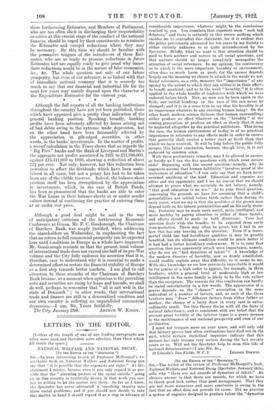LETTERS TO THE EDITOR.
[Letters of the length of one of our leading paragraphs are often more read,and therefore more effective, than those which fill treble the space.] NATIONAL WELFARE AND NATIONAL DECAY.
[TO THE EDITOR OF THE " SPECTATOR:9
Sna,—In your• interesting review of Professor McDougall's re- markable book on National Welfare and National Decay you say that "it is possible that the eugenists are right." At this statement I rejoice, because even if you only regard it as pos- sible that the " alarming picture of the racial suicide " going en in this country is truthfully drawn in that work you can- not be willing to let the matter rest there. So far as I know, the Spectator has never advocated a searching inquiry into these racial problems; and if you should now decide to take this matter in hand I should regard it as a step in advance"of
considerable importance, whatever• might be the conclusions reached by you. You complain that eugenists seem " such bad debaters," and there is certainly in this review nothing which enables me to contradict this statement, for it is evident that the policy persistently advocated for ten years by my Society is either entirely unknown to or quite misunderstood by the
Spectator. Briefly, what we want is that attention should be paid to both nurture and nature in all social questions, and
that nurture should no longer completely monopolize the attention of social reformers. In my opinion, the controversy as to which is the more important, heredity or environment, often does as much harm as good; for the answer depends largely on the meaning we choose to attach to the words we use. Social reformers, as a rule, measure the "importance " of any agency by the extent to which they can utilize it in their efforts to benefit mankind; and as to the word "heredity," it is often applied to the whole bundle of tendencies with which we were endowed before birth Now, no man can be born again in the
flesh; our initial handicap in the race of life can never be changed; and it is in a sense true to say that his heredity is of
no importance whatever to any existing human being! On the other hand, modern science declares that human surroundings either produce no effect whatever on the " heredity " of the coming generation, or produce an effect so slowly that it may be neglected altogether by the practical politicians. This being the case, the human environment of to-day is of no practical importance in reference to any efforts made in order to ensure that posterity shall receive a better start at birth than that which we have received. It will be long before the public fully accepts this latter conclusion, because, though true, it is not endorsed by common sense.
With these preliminary remarks, may I be allowed to answer as briefly as I can the five questions with which your review ends? Beginning with the second question—namely, why do
eugenists assume that human fallibility "involves proof of the uselessness of education "—I can only say that we have never
assumed anything of the kind. Education and eugenics are allies and not opponents; and I see no reason that we should attempt to prove what we certainly do not believe, namely, " that good education is no use." As to your third question,
concerning the grounds we have for assuming that a child's potentialities are settled before birth rather than during its
early years, what we say is that the qualities of tho grown man depend both on his inborn potentialities and on his early train- ing. Posterity may be made more moral, more intelligent, and more healthy by paying attention to either of these factoi•s; and efforts should be made in both directions. Your last question deals with the benefits to be expected from early transportation. These may often be great, but I fail to see how this has any bearing on the question. Even if a trans- ported child has bad hereditary qualities it may be greatly
benefited, but its ultimate condition would be much better if it had had a better hereditary endowment. It is to your first question that you apparently attach most importance, namely, why do not we "find dynasties of talent"? A knowledge of the modern theories of heredity, now so firmly established, would readily explain away this difficulty, so it seems to me.
With this knowledge we see how extremely improbable it would be for genius of a high order to appear, for example, in three brothers; whilst a general level of moderately high or low intelligence in the same family is likely to be the rule rather than the exception. The reasons for this conclusion can hardly be stated satisfactorily in a few words. The appearance of a genius depends on the " chance " association in the same individual of a number of factors, and, as each of the three brothers may "draw" different factors from either father or mother, the chance of a lucky draw in every case is extra- ordinarily small. Yet this theory fits in with all the facts of natural inheritance, and is consistent with our belief that the present great fertility of the inferior types is a grave menace to the maintenance of our national prosperity and even of our civilization.
I must not trespass more on your space, and will only add that history proves how often civilizations have died out in the past, whilst certain statistical inquiries indicate that this menace has only become very serious during the last seventy years or so. Will not the Spectator help to stem this tide of national deterioration?—I am, Sir, &c., 11 Lincoln's Inn Fields, W.C. 2. LEONARD DARWIN.


































 Previous page
Previous page